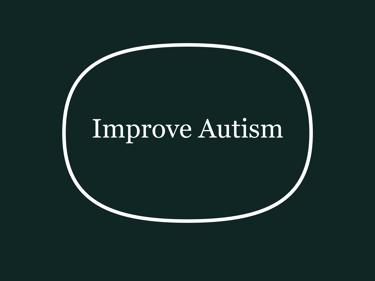A modified ketogenic gluten-free diet with MCT improves behavior in children with autism spectrum disorder
Authors:
Lee, R.W., Corley, M.J., Pang, A., Arakaki, G., Abbott, L., Nishimoto, M., Miyamoto, R., Lee, E., Yamamoto, S., Maunakea, A.K. and Lum-Jones, A.
Summary of the Article
The study was an open-label clinical trial conducted at Shriners Hospitals for Children in Honolulu, Hawaii, to investigate the effects of a modified ketogenic gluten-free diet supplemented with medium-chain triglycerides (MCT) on children with autism spectrum disorder (ASD). Fifteen children, aged 2 to 17 years, participated in the trial, which aimed to determine if this dietary intervention could improve core ASD symptoms, such as social communication difficulties and restricted, repetitive behaviors. The diet was followed for 3 months, with some participants continuing for 6 months. The researchers used standardized tools—the Autism Diagnostic Observation Schedule, 2nd Edition (ADOS-2) and the Childhood Autism Rating Scale, Second Edition (CARS-2)—to assess changes in behavior, alongside biochemical measures like ketone levels and lipid profiles.
The findings suggest that the diet led to significant improvements in social communication (measured by the ADOS-2 social affect domain) and specific behaviors like imitation, body use, and fear or nervousness (measured by CARS-2) after 3 months. However, no notable changes were observed in restricted and repetitive behaviors. Approximately half of the participants showed moderate to substantial improvement, and those who continued the diet for 6 months maintained these gains. The study also found associations between improvements and baseline levels of HDL cholesterol and albumin, suggesting that children with lower levels of these markers might benefit more. Despite these promising results, the study highlights the need for further research due to its small sample size, lack of a control group, and challenges with diet adherence.
Key Findings
ADOS-2 Results: After 3 months, the social affect score improved by about 20% (p = 0.006), and the overall total score improved by approximately 20% (p = 0.017). No significant change was seen in restricted and repetitive behavior scores (p = 0.125). For the 10 participants assessed at 6 months, improvements in social affect were sustained (p = 0.019), but repetitive behaviors remained unchanged (p = 0.218).
CARS-2 Results: Significant improvements were observed in imitation (p = 0.031), body use (p = 0.008), and fear or nervousness (p = 0.039) after 3 months.
Participant Improvement:
6 out of 15 (40%) showed substantial improvement (>30% decrease in ADOS-2 total score).
2 out of 15 (13.3%) showed moderate improvement (>3 units decrease).
7 out of 15 (46.7%) showed minor or no improvement.
Overall, 53.3% (8 out of 15) had moderate to substantial improvement.
Biochemical Changes: Beta-hydroxybutyrate (BHB) levels increased (p = 0.025), indicating ketosis. HDL cholesterol (p = 0.018), LDL cholesterol (p = 0.032), and total cholesterol (p = 0.003) increased, while eosinophil percentage decreased (p = 0.044), possibly linked to reduced inflammation.
Correlations: Improvements in ADOS-2 scores were associated with lower baseline HDL (p = 0.007) and albumin (p = 0.019) levels, as well as changes in these markers during the diet (HDL: p = 0.049; albumin: p = 0.010).
Details of the Diet
Type of Diet: A modified ketogenic gluten-free diet with MCT:
Low in carbohydrates: Limited to 20-25 grams of net carbs per day.
Moderate in protein: Calculated based on age and weight, up to twice the Recommended Dietary Allowance (RDA).
High in fat: Majority of energy from fats, with 20% of energy needs from MCT oil (sourced from coconut or pure MCT oil).
Gluten-free: Excluded wheat, barley, and rye products.
Duration: Participants followed the diet for 3 months, with 10 continuing for 6 months.
Monitoring: Caregivers checked urine ketones twice daily for the first month, then once daily, to ensure ketosis.
Symptoms That Improved
Social Communication: Significant improvement in the ADOS-2 social affect domain, reflecting better social interaction and communication skills.
Specific Behaviors (CARS-2): Improvements in:
Imitation: Better ability to mimic actions.
Body Use: Enhanced physical coordination or expression.
Fear or Nervousness: Reduced anxiety-related behaviors.
Parent-Reported Changes: Caregivers noted improvements in eye contact, interest in others, meaningful language, schedule transitions, focus, and hyperactivity.
Percentage of Participants Who Improved
53.3% (8 out of 15) showed moderate to substantial improvement in ADOS-2 scores:
40% (6 out of 15) had substantial improvement (>30% decrease in ADOS-2 total score).
13.3% (2 out of 15) had moderate improvement (>3 units decrease).
Timeline for Symptom Improvement
3 Months: Significant improvements in social affect and specific CARS-2 items were observed at the 3-month assessment. The study does not specify when changes began, but they were evident by this point.
6 Months: For those who continued, improvements in social affect were maintained, suggesting that benefits stabilized rather than increased further.
Considerations (Pros and Cons)
Pros:
Improves social communication and specific behaviors in about half of the participants.
May be particularly effective for children with lower baseline HDL and albumin levels.
Benefits were sustained at 6 months for those who continued.
Cons:
No significant effect on restricted and repetitive behaviors.
Strict adherence is challenging, especially for children with ASD who may have feeding difficulties.
Side effects (e.g., diarrhea, fatigue, constipation) occurred in the first 2-4 weeks.
Long-term effects and outcomes after stopping the diet are unknown.
Other Notes:
Small sample size (15 participants) limits generalizability.
Lack of a control group makes it hard to attribute improvements solely to the diet.
This study provides preliminary evidence that a modified ketogenic gluten-free diet with MCT can benefit some children with ASD, particularly in social communication, but its limitations and challenges suggest caution and the need for larger, controlled studies.
https://pmc.ncbi.nlm.nih.gov/articles/PMC5863039/
doi: 10.1016/j.physbeh.2018.02.006


